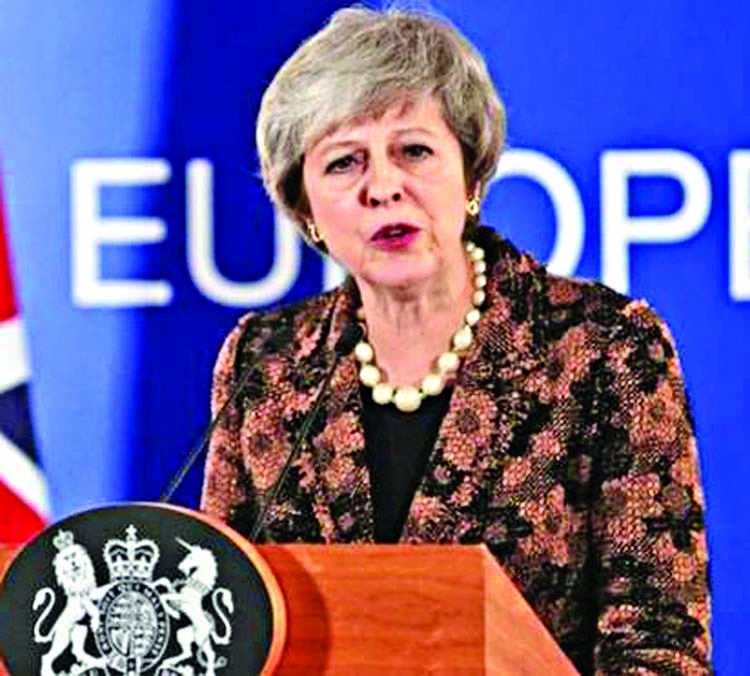May dismisses calls for new Brexit vote

Holding another referendum on the EU would "break faith with the British people", Theresa May will warn MPs. Former PMs John Major and Tony Blair are among those urging a new referendum if MPs cannot agree on a way forward.
But the prime minister will argue that it would do "irreparable damage to the integrity of our politics" and would "likely leave us no further forward". Last week she called off a Commons vote on her Brexit deal, admitting it was likely to be heavily rejected. Blair said last week that while he admired May's determination to get her deal through, with so many MPs opposed to it there was "literally no point in carrying on digging".
He said after 30 months of negotiation, and with the government in "a mess", giving the final say to the people would become the "logical" outcome if every other option were to be exhausted. But May will tell MPs on Monday: "Let us not break faith with the British people by trying to stage another referendum.
"Another vote which would do irreparable damage to the integrity of our politics, because it would say to millions who trusted in democracy, that our democracy does not deliver. And another vote which would further divide our country at the very moment we should be working to unite it."
On Sunday she said Blair's backing for another referendum was "an insult to the office he once held" and risked undermining Brexit negotiations.
Business Secretary Greg Clark echoed the prime minister's comments on BBC Radio 4's Today Program, arguing that a fresh vote would "continue uncertainty". He also said, that if Parliament did not approve May's deal, it should be "invited to say what it would agree with" on a Brexit deal.
"Businesses expect MPs to take responsibility rather than just be critics," Mr Clark added. However Dame Margaret Beckett, a former foreign secretary and supporter of the People's Vote campaign for a fresh referendum, said the case was becoming "overwhelming" and was "the best way forward for our country".
"A new public vote would be different from the referendum in 2016 because we now know more about what Brexit means. "Any effort to force Brexit over the line without checking that it has the continued consent of the British people will only reinforce divisions."
Meanwhile, writing in his Daily Telegraph column, former Foreign Secretary Boris Johnson said a second referendum would "provoke instant, deep and ineradicable feelings of betrayal". The Brexiteer said the idea a fresh poll would be held was "sickening". The prime minister is due to update MPs at 15:30 GMT on last week's European Council summit, where she made an appeal to EU leaders to help get the deal "over the line".
She went to Brussels at the end of a week in which she delayed the Commons vote on her Brexit deal, admitting it would be rejected by a significant margin, and then went on to survive a vote of no confidence in her leadership by Conservative MPs by 200 votes to 117.
She had been seeking legal assurances over the controversial "backstop" plan to prevent a hard border between Northern Ireland and the Irish Republic, if no trade deal is reached. But EU leaders told her the negotiated withdrawal agreement was "not open for renegotiation", although some clarification was possible.
May said on Friday that her talks with EU leaders had shown that "further clarification and discussion" was possible and that the UK would be "working expeditiously over the coming days to seek those further assurances I believe MPs will need". But Labor leader Jeremy Corbyn said her deal was now "dead in the water" and the prime minister had "utterly failed in her attempts to deliver any meaningful changes".
Labor says it will put pressure on her to hold the vote on it this week. The government says the vote will now be held before 21 January. On Sunday, senior Tory Brexiteer Liam Fox told the BBC that unless MPs' concerns were addressed, the deal was unlikely to get through the Commons. If it could not, he suggested: "Parliament would have to decide on the alternatives." He suggested giving MPs a free vote could be one option.
There were reports in the Sunday newspapers that two of May's key allies were planning for another referendum, in the event that her deal cannot get MPs' backing. Both men - Downing Street chief of staff Gavin Barwell and May's de facto deputy David Lidington - distanced themselves from the reports. Barwell tweeted: "Happy to confirm I am not planning a 2nd referendum with political opponents (or anyone else to anticipate the next question."
